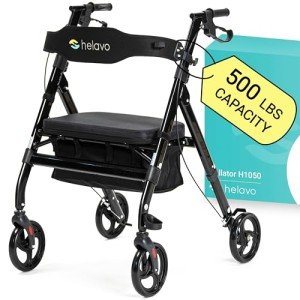Five Killer Quora Answers On Handicapped Walker
페이지 정보
작성자 Catharine 작성일 25-09-08 11:55 조회 3 댓글 0본문
The Essential Guide to Handicapped Walkers: Enhancing Mobility for Individuals with Disabilities
Walking help play an important function in improving the quality of life for individuals with handicaps. Amongst these, handicapped walkers, likewise called walkers or rollators, are indispensable tools that help users in keeping mobility, self-reliance, and safety. This blog post intends to supply a thorough introduction of handicapped walkers, discussing their types, benefits, and essential considerations for users when choosing a Heavy-Duty Rollator Walker that best fits their requirements.
Table of Contents
- What Is a Handicapped Walker?
- Types of Handicapped Walkers
- Standard Walkers
- Two-Wheeled Walkers
- Four-Wheeled Walkers
- Innovative Rollator Features to Consider When Selecting a Walker
- Advantages of Using Handicapped Walkers
- FAQs
- Conclusion
What Is a Handicapped Walker?
A handicapped walker is a mobility aid created to assist people who have difficulty walking or keeping balance due to impairments, injuries, or aging. It provides support, stability, and security, helping users navigate their environment with higher confidence and independence. Handicapped walkers are available in numerous styles to suit different mobility challenges, making them flexible tools for many individuals.
Types of Handicapped Walkers
Comprehending the different kinds of walkers is vital for selecting the right one. Below is a summary of the main kinds of handicapped walkers:
| Type | Description | Perfect For |
|---|---|---|
| Standard Walkers | Basic frame without any wheels, needing the user to raise it to move. | Individuals with stable balance. |
| Two-Wheeled Walkers | A lightweight walker geared up with two front wheels for much easier motion. | Users requiring more mobility support. |
| Four-Wheeled Walkers | An advanced model with four wheels, handlebars, and frequently a seat. | Those needing maximum support and rest choices. |
1. Requirement Walkers
Requirement walkers, one of the most fundamental version, are built as a strong frame. Users raise the walker and place it forward, enabling steady movement. This type of walker is perfect for people with minimal mobility however who maintain good balance.

2. Two-Wheeled Walkers
These walkers include 2 front wheels, significantly improving maneuverability compared to standard walkers. Users can push the walker rather of raising it, making it simpler to browse.
3. Four-Wheeled Walkers
Likewise understood as rollators, four-wheeled walkers come with wheels on all four legs, making them easy to push. Lots of designs likewise feature a comfortable seat and back-rest, allowing users to take breaks throughout longer strolls or outings.
Features to Consider When Selecting a Walker
Before buying a handicapped walker, it's vital to assess particular features that may enhance the user experience and safety. Here are some important considerations:
| Feature | Description |
|---|---|
| Weight Capacity | Guarantee the walker supports the user's weight. |
| Height Adjustability | Search for Adjustable Walker handlebars for an appropriate fit. |
| Wheels Quality | Take a look at if the wheels are robust for numerous terrains. |
| Brake System | Identify if it has a Reliable Walker braking mechanism for security. |
| Storage Options | Consider if it has a basket or bag for individual items. |
Benefits of Using Handicapped Walkers
The benefits of using handicapped walkers extend beyond mobility, supplying psychological and physical advantages:
- Increased Independence: Walkers allow users to move without relying excessively on caretakers or relative.
- Improved Safety: With enhanced stability, walkers considerably decrease the risk of falls, contributing to a safer living environment.
- Improved Confidence: Users often report feeling more secure and confident when utilizing a walker, encouraging them to engage more in social activities.
- Health Benefits: Regular usage of a walker can promote exercise, leading to much better cardiovascular health, improved muscle tone, and total wellness.
FAQs
1. How do I understand which kind of walker is best for me?
Picking the best walker depends on your physical capabilities and mobility requirements. Consulting with a healthcare expert or physical therapist can offer customized recommendations based upon your specific health situation.
2. How should I preserve my walker?
Regularly check your Easy-To-Use Walker for wear and tear, primarily concentrating on the wheels and brakes. Clean down surface areas with a moist cloth to keep it clean and shop it in a dry location when not in use.
3. Can I utilize a walker on irregular surfaces?
While some walkers are better matched for unequal surfaces than others, caution is advised. It may be useful to select a walker with larger wheels for better stability on such terrains.

4. Are there walkers designed particularly for outdoor usage?
Yes, numerous four-wheeled walkers are specifically developed for outdoor use, including bigger wheels and more robust building to handle various surfaces.
5. Do walkers can be found in various colors or designs?
Yes, numerous designs, colors, and styles are available to cater to personal choices while still satisfying practical requirements.
Handicapped walkers are transformative help that can substantially enhance the lifestyle for people facing mobility obstacles. By comprehending the kinds of walkers, their features, and the benefits they use, users can make educated options that align with their individual mobility requirements. As technology and design develop, the future of handicapped walkers promises even greater assistance and comfort, motivating self-reliance and an active way of life for all.
- 이전글 Nine Things I'd Do If I would Begin Again Viagra
- 다음글 Миссия в Порту-Сегуру (Фильм 2025) смотреть онлайн
댓글목록 0
등록된 댓글이 없습니다.

